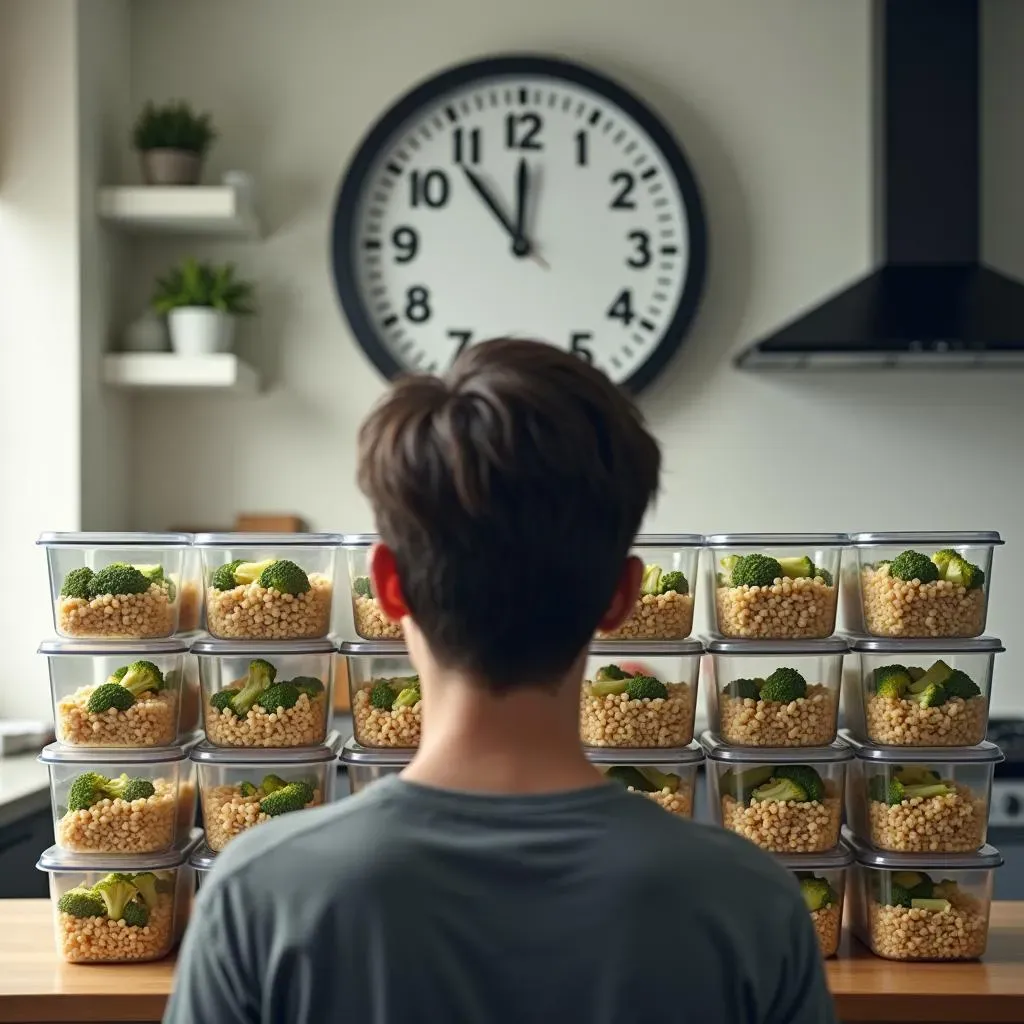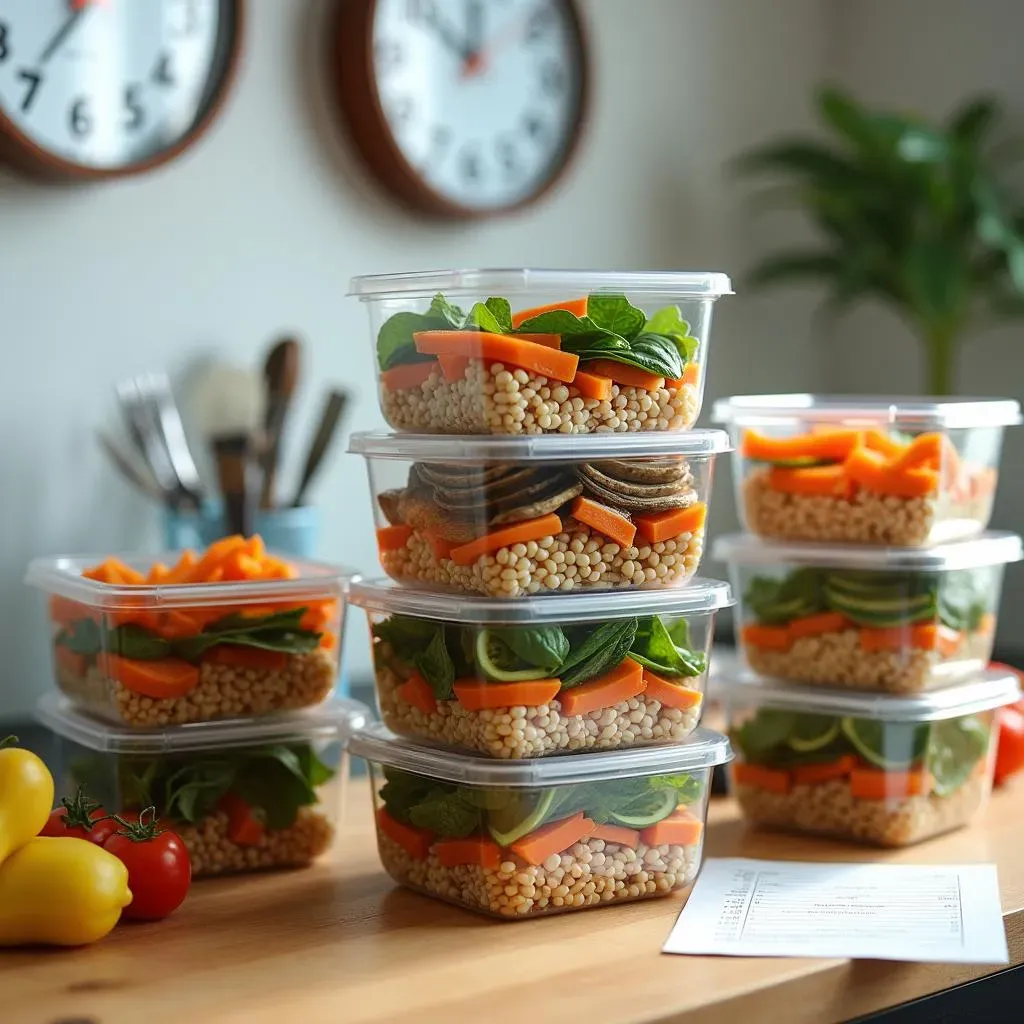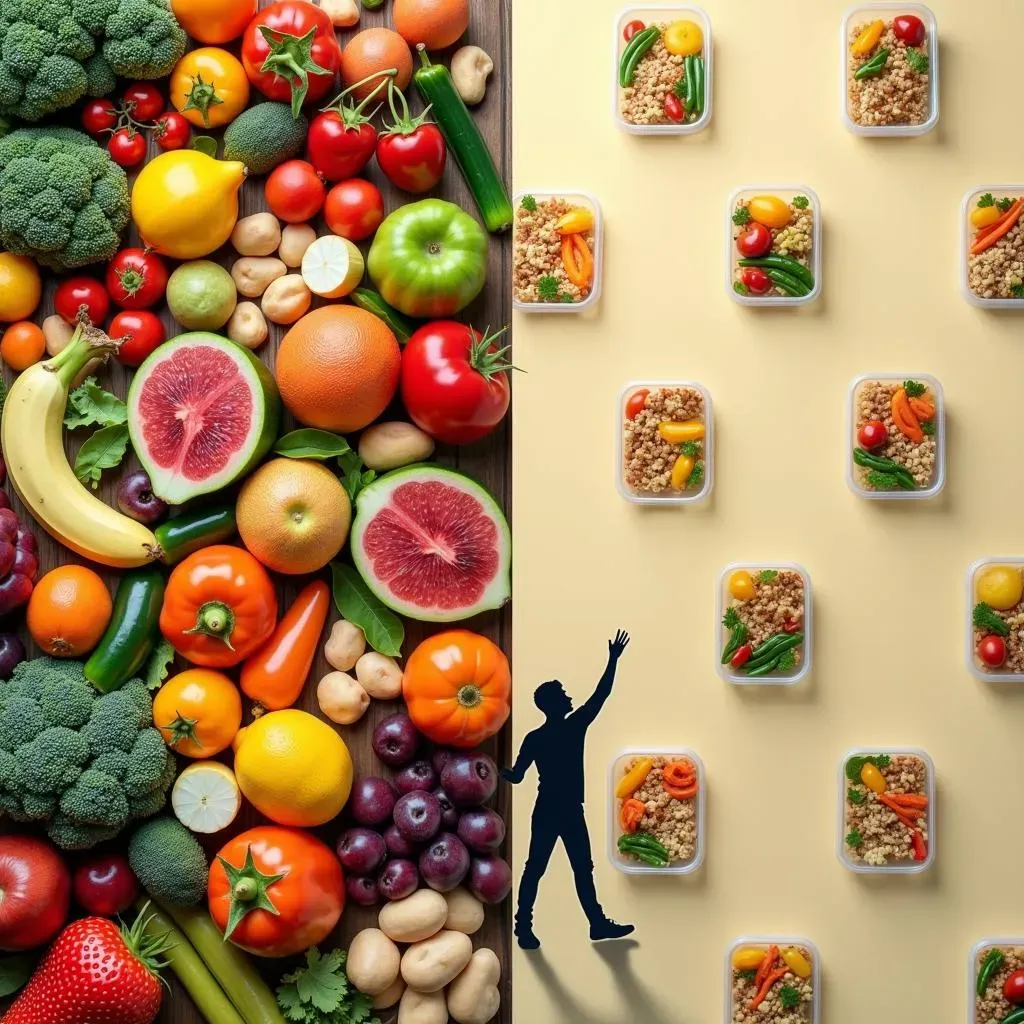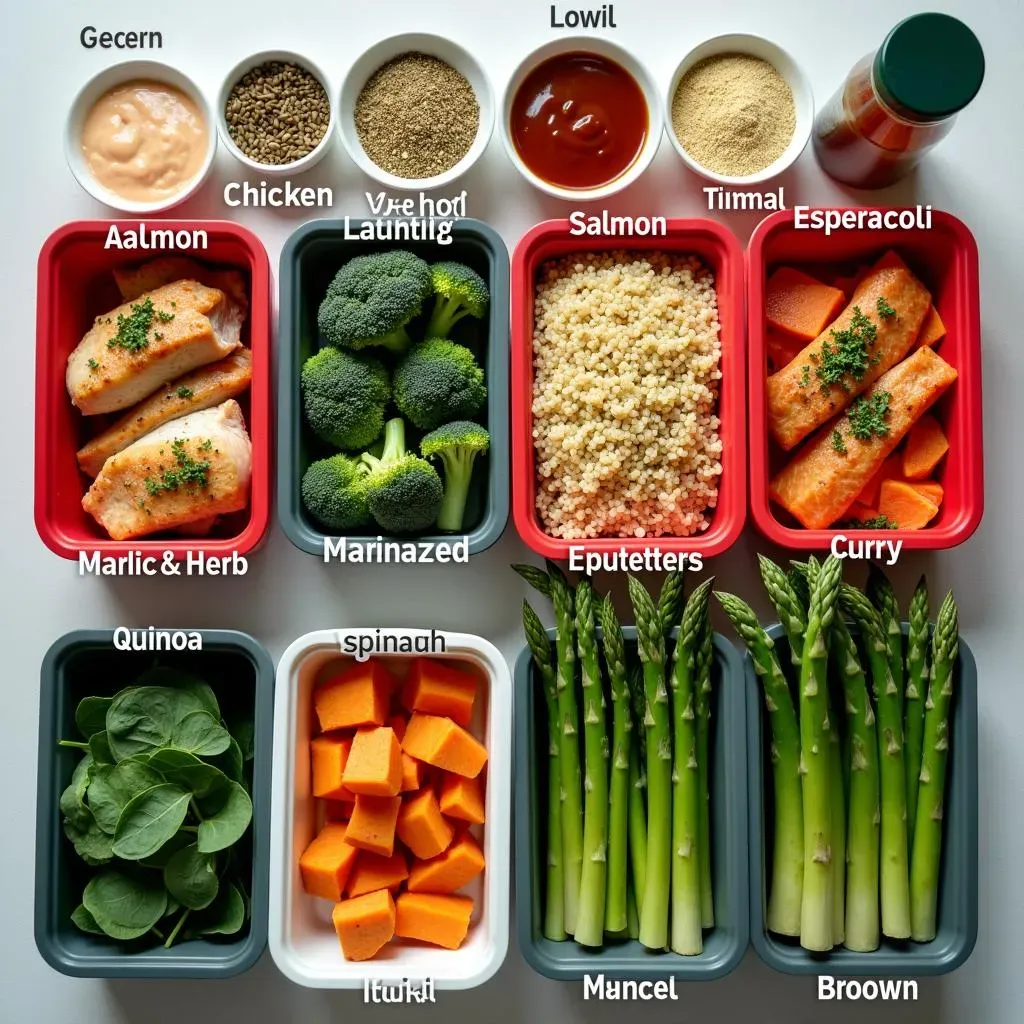Table of Contents
Picture this: a fridge packed with identical containers, each holding the exact same meal. For many, this is the reality of meal prepping. But is it a genius time-saver or a recipe for culinary boredom? If you're wondering, "Do you eat the same thing everyday when meal prepping?" you're not alone. The question sparks debate among fitness enthusiasts, busy professionals, and anyone looking to streamline their diet.
The Meal Prep Monotony: Why People Eat the Same Thing Every Day

The Meal Prep Monotony: Why People Eat the Same Thing Every Day
Ever wonder why some people willingly sign up for the same meals, day after day? It's not always about a lack of imagination in the kitchen. For many, the meal prep monotony is a calculated strategy. Time is a huge factor. In our always-on world, carving out hours for daily cooking can feel impossible. Meal prepping, especially with identical meals, streamlines the process. Batch cooking on a Sunday afternoon means you're set for the week, freeing up precious time during those hectic weekdays.
It's also about control. When you eat the same thing every day, you know exactly what you're consuming – calorie counts, macros, and ingredients are all predictable. This is especially appealing for those with specific fitness or health goals. Bodybuilders tracking protein intake, or individuals managing dietary restrictions, often find comfort and efficiency in the consistency of a repetitive meal plan. Moreover, minimizing decision fatigue is a major draw. Deciding what to eat three times a day can be surprisingly draining. By automating your meals, you eliminate those daily decisions, freeing up mental energy for other tasks. Ultimately, for many, the perceived benefits of efficiency, control, and reduced stress outweigh the potential for boredom.
Benefits of Eating the Same Thing Everyday When Meal Prepping

Benefits of Eating the Same Thing Everyday When Meal Prepping
Time Efficiency and Streamlined Nutrition
Let's be real, time is money, and in today's fast-paced world, saving time is a major win. One of the biggest benefits of eating the same thing everyday when meal prepping is the sheer efficiency it offers. Think about it: you only need to plan one meal, create one shopping list, and execute one cooking session. This eliminates the daily "what's for dinner?" dilemma and frees up hours that would otherwise be spent on meal planning, grocery shopping, and cooking individual meals. It's a game-changer for busy professionals, students, or anyone juggling multiple commitments.
Beyond time savings, eating the same meal every day allows for precise control over your nutrition. You know exactly what you're putting into your body, making it easier to track calories, macros, and micronutrients. This level of consistency is invaluable for individuals with specific dietary goals, whether it's weight loss, muscle gain, or managing a health condition. By removing the guesswork and variability from your diet, you can optimize your nutrition and achieve your desired results more effectively.
Cost Savings and Reduced Food Waste
Another often-overlooked advantage of sticking to the same meal prep is the potential for significant cost savings. When you buy ingredients in bulk for a single meal, you can often take advantage of discounts and reduce the overall cost per serving. Plus, you're less likely to impulse buy unhealthy snacks or dine out when you have a fridge full of ready-to-eat, nutritious meals. It's a budget-friendly approach to healthy eating that can free up your finances for other priorities.
Furthermore, eating the same thing every day minimizes food waste. How many times have you bought a bunch of fresh produce with good intentions, only to have it wilt away in the crisper drawer? When you're prepping the same meal each week, you're more likely to use all the ingredients you buy, reducing food waste and saving money in the process. It's a sustainable and responsible way to manage your food consumption and contribute to a more environmentally friendly lifestyle.
Drawbacks of Sticking to the Same Meal Prep Every Day

Drawbacks of Sticking to the Same Meal Prep Every Day
Nutritional Deficiencies and Imbalances
While consistency can be a boon, one of the most significant drawbacks of sticking to the same meal prep every day is the potential for nutritional deficiencies. No single food or meal provides all the nutrients your body needs to thrive. By limiting your diet to a single set of ingredients, you risk missing out on essential vitamins, minerals, and antioxidants found in a variety of other foods. This can lead to imbalances in your nutrient intake and, over time, may negatively impact your health.
For example, if your go-to meal prep consists primarily of chicken, rice, and broccoli, you might be lacking in vitamin C, iron, and healthy fats. While these are all healthy foods, relying on them exclusively can create nutritional gaps. It's crucial to ensure that your diet encompasses a wide range of nutrients to support optimal health and well-being.
The Dreaded Food Fatigue and Decreased Enjoyment
Let's face it: eating the same thing day in and day out can get incredibly boring. Food fatigue is a real phenomenon that can lead to decreased enjoyment of your meals and, ultimately, derail your healthy eating habits. When you're no longer excited about what you're eating, you're more likely to crave unhealthy alternatives or abandon your meal prep altogether. Variety is not just the spice of life; it's also essential for maintaining a healthy and sustainable relationship with food.
Imagine eating your favorite dish every day for weeks on end. Eventually, even the most delicious meal will lose its appeal. This can lead to a sense of restriction and deprivation, making it harder to stick to your healthy eating plan in the long run. Remember, food should be both nourishing and enjoyable.
Social Limitations and the Risk of a Restrictive Mindset
Beyond the nutritional and emotional aspects, sticking to the same meal prep can also create social limitations. When you're always eating the same thing, it can be challenging to dine out with friends, attend social gatherings, or travel without disrupting your routine. This can lead to feelings of isolation and make it harder to maintain a balanced lifestyle.
Moreover, a rigid adherence to a single meal plan can foster a restrictive mindset towards food. You may become overly focused on controlling your diet and develop an unhealthy relationship with food. It's important to remember that food is not just fuel; it's also a source of pleasure, connection, and cultural experience. Allowing yourself some flexibility and variety in your diet can help you maintain a healthy perspective and avoid the pitfalls of a restrictive eating pattern.
Breaking the Cycle: How to Diversify Your Meal Prep and Avoid Food Fatigue While Still Meal Prepping

Breaking the Cycle: How to Diversify Your Meal Prep and Avoid Food Fatigue While Still Meal Prepping
Embrace Variety: Simple Swaps and Rotations
so you're ready to ditch the meal prep monotony but don't want to throw the baby out with the bathwater? I get it! The key is to diversify your meal prep without making it a logistical nightmare. Start with simple swaps. Instead of chicken every day, rotate between chicken, fish, lean beef, and plant-based protein sources like lentils or tofu. Change up your grains too – quinoa, brown rice, farro, and sweet potatoes offer different nutrients and textures. And don't forget your veggies! Aim for a rainbow of colors to ensure you're getting a wide range of vitamins and minerals.
Think about creating a weekly meal plan with a rotating cast of ingredients. For example, Monday could be chicken and roasted vegetables, Tuesday could be lentil soup, Wednesday could be salmon with quinoa, and so on. This way, you're still prepping in advance, but you're introducing enough variety to keep things interesting and prevent nutritional deficiencies. It’s all about smart planning, not starting from scratch every single day.
Protein Source | Grain/Carb | Vegetable | Flavor Profile |
|---|---|---|---|
Chicken Breast | Brown Rice | Broccoli | Garlic & Herb |
Lentils | Quinoa | Spinach | Curry |
Salmon | Sweet Potato | Asparagus | Lemon & Dill |
Flavor Boosters: Sauces, Spices, and Herbs
Another fantastic way to combat food fatigue is to experiment with different flavor profiles. Even if you're using the same base ingredients, a simple change in sauce, spice, or herb can transform your meal from boring to exciting. Explore different cuisines and try incorporating flavors from around the world. A dash of chili flakes, a squeeze of lime, or a sprinkle of fresh cilantro can make all the difference.
Consider investing in a well-stocked spice rack and experimenting with different combinations. Make your own marinades and sauces using fresh herbs, garlic, ginger, and other flavorful ingredients. Not only will this add variety to your meals, but it will also allow you to control the sodium and sugar content, making your meal prep even healthier. Get creative and have fun with it! Food is meant to be enjoyed, so don't be afraid to experiment and discover new flavors that you love.
- Spice it up: Add chili flakes, smoked paprika, or a dash of cayenne pepper for heat.
- Go fresh: Incorporate fresh herbs like basil, mint, cilantro, or parsley for brightness.
- Sauce it: Experiment with different sauces like pesto, sriracha, or a homemade vinaigrette.
Deconstructed Meals: The Art of Assembly
Sometimes, the simple act of changing how you present your meal can make a big difference. Instead of combining all your ingredients into a single container, try deconstructing your meals and assembling them fresh each day. This allows you to control the texture and temperature of each component, preventing everything from becoming a soggy mess. Plus, it gives you the feeling of creating a "new" meal each day, even if you're using the same basic ingredients.
For example, instead of packing a pre-made salad, pack your greens, protein, and dressing separately and assemble them right before you eat. Or, instead of mixing your rice and vegetables together, keep them separate and add a different sauce or topping each day. It's a small change that can make a big impact on your overall eating experience.
Finding Your Meal Prep Sweet Spot
So, should you eat the same thing everyday when meal prepping? The answer, as with most things in nutrition, is: it depends. For some, the consistency and simplicity are key to sticking to their goals. For others, the lack of variety can lead to burnout. The best approach is to experiment and find what works for you. Listen to your body, pay attention to your cravings, and don't be afraid to adjust your meal prep strategy as needed. Whether you embrace the meal prep monotony or opt for a more diverse approach, the ultimate goal is to nourish your body and make healthy eating a sustainable part of your lifestyle.